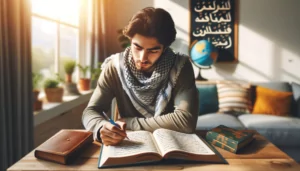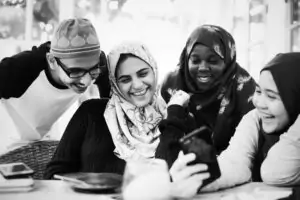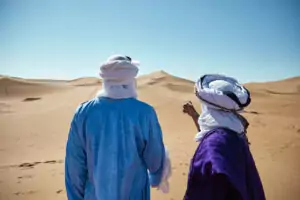Arabic, one of the world’s oldest languages, is as rich and complex as the culture it represents. One of the first phrases language learners usually pick up when studying Arabic is the common greeting “How are you?” Understanding the ways to say, respond to, and appreciate this phrase’s nuances can open doors to deeper, more meaningful conversations. This article will take you on a journey through the Arabic language, exploring the diverse dialects and their unique greetings.

✅ AI Essay Writer ✅ AI Detector ✅ Plagchecker ✅ Paraphraser
✅ Summarizer ✅ Citation Generator
Saying ‘How Are You?’ in Modern Standard Arabic
Modern Standard Arabic, used in formal contexts such as literature and academia, offers a classical way to ask “How are you?” The phrase “كيف حالك؟” (Kayfa Haluka) is the typical expression used to inquire about someone’s well-being. It’s a formal way of expressing interest in another’s state and is appropriate to use in any Arabic-speaking country.
In response to “Kayfa Haluka?”, several expressions can be used depending on the context and your current state. For instance, “بخير، شكراً” (Bikhair, Shukran) translates to “Fine, thank you.” This is a common response, safe to use in any setting.
‘How Are You?’ Across Different Arabic Dialects
Arabic dialects can vary significantly from region to region, reflecting the diverse cultures and histories of Arabic-speaking populations. Each dialect has its unique way to express “How are you?”, reflecting local customs and colloquial expressions.
“Ezzayak?” in Egyptian Arabic
In Egypt, the colloquial way to ask “How are you?” is “ازيك؟” (Ezzayak). It’s:
- used in casual everyday conversation
- is recognized and understood throughout the country.
An appropriate response to this would be “كويس، شكراً” (Kwayis, Shukran), meaning “Good, thank you.”
“Labas?” in Maghrebi Arabic
The Maghrebi dialect, encompassing Algeria, Tunisia, and Morocco, uses the phrase “لاباس؟” (Labas) to ask “How are you?” This is a casual, common greeting used in everyday conversation in the Maghreb region. The typical response to this is “ملاح، شكراً” (Mlah, Shukran), translating to “Fine, thank you.”
“Shlonak?” in Gulf Arabic
In Gulf Arabic, which is spoken in countries like the U.A.E, Saudi Arabia, Qatar, and Kuwait, the phrase “شلونك؟” (Shlonak) is used to ask “How are you?” An appropriate reply would be “زين، شكراً” (Zain, Shukran), meaning “Good, thank you.”
“Kifak?” in Levantine Arabic
Finally, in the Levantine dialect spoken in the Eastern Mediterranean region, including countries like Lebanon and Syria, the common expression for “How are you?” is “كيفك؟” (Kifak). In response, one might say “منيح، شكراً” (Mniha, Shukran), which translates to “Fine, thank you.”
Conclusion
This language, with its diverse dialects, offers a rich tapestry of expressions to ask “How are you?” and express thanks in Arabic. These greetings, while seemingly simple, provide a window into the cultures and customs of various Arabic-speaking regions. So, the next time you want to engage in a conversation with an Arabic speaker, remember these phrases. Not only will they serve as excellent conversation starters, but they will also demonstrate your appreciation and respect for the cultural nuances of their language.
FAQ
What are the common Arabic greetings?
Common Arabic greetings include “السلام عليكم” (As-Salamu Alaykum), which means “Peace be upon you,” and “مرحبا” (Marhaba), meaning “Hello.” These greetings are widely accepted across all Arabic-speaking regions.
Are there different ways to ask “How are you?” in Arabic?
Yes, there are different ways to ask “How are you?” in Arabic, depending on the dialect and region. Examples include “Kayfa Haluka?” in Modern Standard Arabic, “Ezzayak?” in Egyptian Arabic, “Labas?” in Maghrebi Arabic, “Shlonak?” in Gulf Arabic, and “Kifak?” in Levantine Arabic.
Can you provide examples of polite responses in Arabic?
Certainly, polite responses to “How are you?” in Arabic could be “Bikhair, Shukran” in Modern Standard Arabic, “Kwayis, Shukran” in Egyptian Arabic, “Mlah, Shukran” in Maghrebi Arabic, “Zain, Shukran” in Gulf Arabic, and “Mniha, Shukran” in Levantine Arabic. Each response translates to “Fine, thank you.”
What are some informal ways to ask “How are you?” in Arabic?
Informal expressions for “How are you?” vary across dialects but can include “Ezzayak?” in Egyptian Arabic, “Labas?” in Maghrebi Arabic, “Shlonak?” in Gulf Arabic, and “Kifak?” in Levantine Arabic.
Do Arabic greetings vary across different Arabic-speaking countries?
Yes, Arabic greetings can vary significantly across different Arabic-speaking countries, often reflecting regional dialects and cultural practices.
Are there cultural considerations when using Arabic greetings?
Absolutely, Arabic greetings often carry cultural significance. They’re not just about the language but also about the etiquette. For instance, many Arabic greetings incorporate blessings or well-wishes, reflecting the culture’s deep-rooted respect and hospitality.
How can I respond to “How are you?” in Arabic appropriately?
The appropriate response to “How are you?” in Arabic largely depends on the dialect being used, but a general response could be “Bikhair, Shukran,” which translates to “Fine, thank you.”
Can you suggest other useful Arabic phrases for greetings and conversations?
Sure, other useful Arabic phrases include “صباح الخير” (Sabah Al-Khair) for “Good morning,” “مساء الخير” (Masaa Al-Khair) for “Good evening,” and “تصبح على خير” (Tusbih Ala Khair) for “Good night.”
Where can I practice speaking Arabic with native speakers?
There are many online language exchange platforms where you can practice speaking Arabic with native speakers, such as Tandem and HelloTalk. Additionally, language schools and cultural institutes often provide opportunities for language practice and cultural exchange.
Follow us on Reddit for more insights and updates.





Comments (0)
Welcome to A*Help comments!
We’re all about debate and discussion at A*Help.
We value the diverse opinions of users, so you may find points of view that you don’t agree with. And that’s cool. However, there are certain things we’re not OK with: attempts to manipulate our data in any way, for example, or the posting of discriminative, offensive, hateful, or disparaging material.